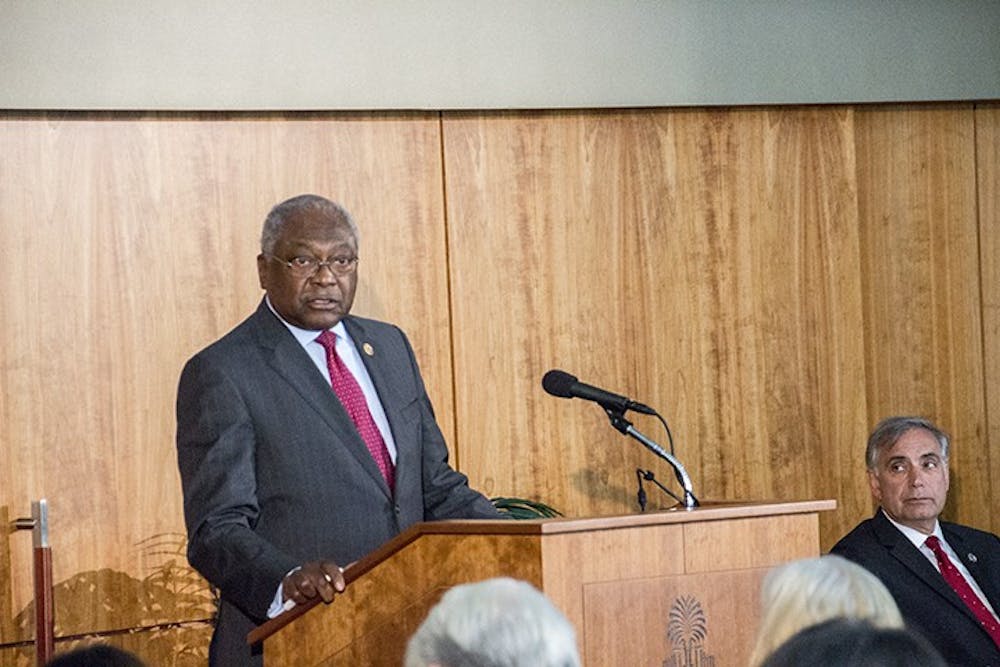University President Harris Pastides announced the formation of the new Center for Civil Rights History and Research to be housed in the Ernest F. Hollings Special Collections Library at an event Monday morning. Additionally Rep. James Clyburn, who serves as assistant House Democratic leader and is the first African-American member of United States Congress from South Carolina since Reconstruction, announced that he will donate his Congressional papers to the center.
The center, described by a press release from the university as “the first single entity dedicated to telling South Carolina’s civil rights story,” will bring together collections previously held by the university from notable civil rights leaders in the state as well as new collections such as that of Clyburn. It is a joint initiative between University Libraries and the College of Arts and Sciences.
Pastides emphasized that the announcement is part of a broader move by the university to acknowledge and pay respect to the state’s history with civil rights while helping bring about progress in South Carolina and around the country.
“The University of South Carolina is renewing its commitment to keep pressing forward,” he said in his address, “and today’s announcement is a big and correct step in the right direction.”
Pastides also noted that the 2013 commemoration of the school’s desegregation helped spark the center’s creation.
“We soon realized that we needed more,” he said. “We needed to establish an additional initiative at the university that would zero in on this state’s unique civil rights history and we realized as well that the place needed to be accessible to students and faculty and scholars from around the United States and worldwide.”
Pastides expressed a desire for the Center to be a place for both research and conversation.
“This center will be nothing less than a place to spark conversation and dialogue, and if necessary debate and difficult conversation, because nothing gets done or will get done without that,” he said.
While the center’s announcement was unrelated to and scheduled before last week’s USC 2020 Vision protests, history Professor Bobby Donaldson, who chairs the center’s implementation committee, acknowledged that the knowledge the center can provide students is critical to creating a healthy community.
“Last Monday, at this very hour, I joined students from our university in a march from Longstreet Theatre to Osborne Administration Building, and during that march I reminded them that they were part of a legacy,” Donaldson said. “Few knew the details of another march on March 2, 1961, when hundreds of students from around the state of South Carolina gathered at Zion Baptist Church on Washington Street for a planned march to the State House to challenge 'the guardians of the status quo' … but regrettably this history, and so many histories about the movement in our state, that had an impact on our community and our nation are not widely known.”
Clyburn recalled his own experiences as one of the students who participated in that same march during his address, and he noted that the university’s renewed commitment to sharing the state’s history with civil rights was a major part of why he chose to donate his congressional papers to the center.
“Dr. Pastides and (University Libraries) Dean McNally, and before them (Gov.) John Carl West, have been after me for years about donating my papers to the University of South Carolina … but my response to their request has always been that my concern extends beyond my papers … I was persuaded because of the vision,” Clyburn said.
In accordance with the law, Clyburn’s Congressional papers will become available after he leaves office and the papers are reviewed. Clyburn’s other papers are housed at his alma mater, South Carolina State University, in Orangeburg, South Carolina.
Donaldson concluded his remarks by describing the center as a place to share the history of South Carolina’s impact on the civil rights movement.
“Today we come to mark the beginning of a new Center for Civil Rights History and Research, but we also come to applaud the important groundwork established by so many.”

